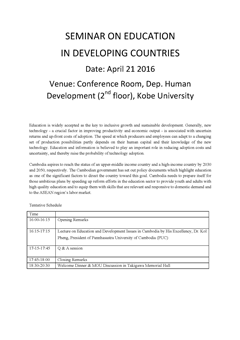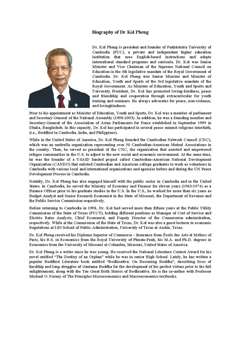Education is widely accepted as the key to inclusive growth and sustainable development. Generally, new technology - a crucial factor in improving productivity and economic output - is associated with uncertain returns and up-front costs of adoption. The speed at which producers and employees can adapt to a changing set of production possibilities partly depends on their human capital and their knowledge of the new technology. Education and information is believed to play an important role in reducing adoption costs and uncertainty, and thereby raise the probability of technology adoption.
Cambodia aspires to reach the status of an upper-middle income country and a high-income country by 2030 and 2050, respectively. The Cambodian government has set out policy documents which highlight education as one of the significant factors to direct the country toward this goal. Cambodia needs to prepare itself for those ambitious plans by speeding up reform efforts in the education sector to provide youth and adults with high quality education and to equip them with skills that are relevant and responsive to domestic demand and to the ASEAN region's labor market.
- Date/time
- April 21, 2016 (Thursday) 16:00-18:00
- Venue
- Conference Room #A220
Dep. Human Development
Kobe University - Organizer
- Graduate School of Human Development and Environment, Kobe University
- Contact
- Masayuki Sato(Kobe University)




